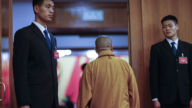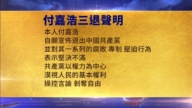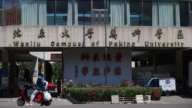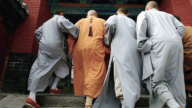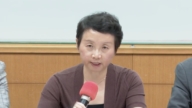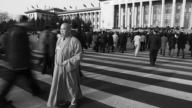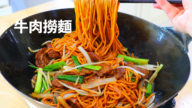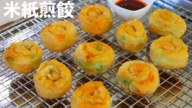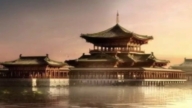【新唐人2012年6月26日讯】5月的一个星期日,北京“景山公园”里,有群众唱起了《洪湖水浪打浪》。在薄熙来刚下台时一度在重庆和北京被禁止的“公园红歌会”,后来恢复了,引发海外媒体的讨论。
有些爱唱红歌的人表示,他们并不认同那些政治性歌词,而是喜欢那熟悉而好听的曲调。所以对红歌里歌颂中共的歌词,或者跳过不唱,或者改成其他歌词。
例如《洪湖水浪打浪》歌词有一句:“共产党的恩情比那东海深,像太阳。”台湾歌手谢采妘录制这首歌时,把歌词里的“共产党”改成了“爹娘”。而被称为 江泽民情妇的宋祖英在美国演唱这首歌时,唱的也是“爹娘的恩情比那东海深”,去掉了“共产党”的内容。
中国大陆电视导演:“到美国这样一个意识形态的氛围里面,它觉得拿国内的这样一种宣传方式去唱,可能不是那么讨好,不是那么受欢迎,可能换一个比较人性化的处理,它是想淡化一下这种意识形态和政治色彩。”
“红歌”和“样板戏”,作为毛泽东时代的遗物,被很多在文革中遭受批斗迫害的人们所厌恶。但从另外一个角度上说,这些中老年人的青春时代,除了接受当时中共强加的这种“革命”和“爱党”教育灌输,没有其它文艺形式可以选择。
大陆一名不愿透露姓名的电视导演向《新唐人》表示,很多中老年人已经过了学唱歌曲的年龄,只熟悉自己青少年时代被灌输的那些红色歌曲。
中国大陆电视导演:“他们没有什么太多可唱的,像《洪湖水浪打浪》在这一代人的成长过程中,它已经是比较抒情的一种曲调了。那你这个时代你还让他唱什么?这个十年、二十年产生的那些超女的歌曲,老人家也唱不了。所以说他还是这个,跟他的怀旧也好,跟他过去可以唱的歌曲资源里边非常有限也有关系。”
“华龙网传媒公司”签约公益歌手杨银波表示,那个年代的人被灌输了这种文化,但每个人唱红歌的初衷不一样,现在唱红歌并不代表赞同当年那种上纲上线的政治形态。
“华龙网传媒公司”歌手 杨银波:“老年人的诠释,那有怀旧的﹔还有一些个,借着这个红歌里面的所谓纯洁性,来对现在当下的现实表达不满﹔还有的就压根儿没想什么政治形态,就是纯粹是业余爱好,因为他们对当下的流行文化有一个隔膜在。”
杨银波在重庆目睹了整个“唱红打黑”的过程,一直在思考红歌问题,他指出,尤其在六四之后,《血染的风采》这首歌曾经被香港歌星梅艳芳翻唱,也被当时的年轻人所传唱,体现了年轻人对爱国的诠释。他认为,目前在海外“红歌”没有市场,因此中共派人出来表演,也只能打“家乡情怀”这张牌。
杨银波“因为现在全世界共产主义阵营这一块是越来越稀缺了,就是大家快把它忘掉了,所以它已经是一个很过时的东西,我理解这首歌就是一个家乡情,仅此而已。”
“红歌”因为具有政治性和煽动性,而被中共作为意识形态的一种武器,但具有讽刺意义的是,红歌也表现出抨击专制制度双向性的作用。
独立评论员 洪剑“只能说明中共是个彻头彻尾的邪教,它那个独裁,对民众的洗脑后,老百姓已经被党文化所 精神控制 ,已经不知道,真正的中华民族的文化是什么?体会不到那五千年传统文化的博大精深和伟大。”
独立评论员洪剑表示,经历过毛时代的人喜爱唱歌,却没有歌可唱,是文化的悲哀。
采访/常春 编辑/尚燕 后制/肖颜
Red Songs Express Nothing but Nostalgia
One Sunday in May, Beijing Jingshan Park saw a group singing
“Waves in Lake Hong”, and a “red” song eulogizing CCP.
Red-song park gatherings were previously banned in Beijing and
Chongqing after Bo Xilai stepped down.
Its current revival calls for attention from global media.
Some from the group of singers said they did not really agree
with the political messages in the lyrics,
though they did enjoy the familiar tunes. They actually
skipped the lyrics in praise of CCP or changed them.
For example, “Waves in Lake Hong” includes a line “The
Party’s favor is deeper than East China Sea, and is like the sun."
Taiwanese singer Michelle Hsieh changed the “Party”
in the lyric into “parents.”
So did Song Zuying, known as Jiang Zemin’s
mistress, when she sang this song in the United States.
They both removed the contents about Communism.
Mainland TV Director: “She must have felt it inappropriate
to bring Mainland China’s propaganda to America to sing the red songs.
So she changed it into a more human way to play down the
ideological and political overtones.”
“Red song” and “model operas",
both products of the Mao period,
have been detested by people who suffered
during the Cultural Revolution.
From another point of view, however, that generation of
Chinese people had no alternative art form outside such “revolutionary" and “patriotic" art education.
A Mainland TV director who chooses to be anonymous told
NTD that many people are already too old to learn new songs.
The only songs they are familiar with are the red songs they
learned when young.
Mainland Chinese TV Director: “They do not have choices
about what to sing.
Songs like “Waves in Lake Hong” are already red songs
with more sentiments than political color.
At the current time, what other songs can you
expect them to sing?
The popular song in the past two decades are
beyond the old generation’s ability to learn.
They can only sing such red songs because of both their nostalgia
and the limited number of songs they are familiar with.”
Yang Yinbo, singer with CQ News Media said, although people
of that generation were instilled with some propaganda,
each individual had his own take of the red songs.
When people now sing those songs, it doesn’t mean they
agree with the extremist political atmosphere of that time.
Yang Yinbo, singer with CQ News Media: “Some elderly
people sing the red songs out of nostalgia,
others resort to them as a way of criticizing the current situation,
still others have no sense of ideology and only take singing as a hobby.
They are isolated from the current popular culture.”
Yang Yinbo witnessed the movement of “sing the red and
strike the black" in Chongqing.
After the June Fourth movement, the song “Bloodstained Glory”
became popular among the young, especially after the introduction by Hong Kong singer Anita Mui.
It embodied the patriotism of the young generation.
He believes that current red songs have no market outside China,
so CCP can only resort to nostalgia to promote those songs.
Yang Yinbo: “Now global Communism is becoming
increasingly weak, almost forgotten by many, so it is already outdated.
I understand that the red songs are only an expression of
homesickness.”
Due to their power of political propaganda, red songs have been
used by CCP to be an ideological weapon.
Ironically, red songs also serve to criticize the autocratic system.
Independent critic Hong Jian: “This only proves that
CCP is a completely evil cult.
After its brainwashing, Chinese people have been controlled
by the Party Culture,
unaware of the authentic and profound Chinese tradition
of the past 5000 years.”
Independent critic Hong Jian said that people who grew up
from the Mao era loved singing but had no songs to sing, which is indeed a pity.



